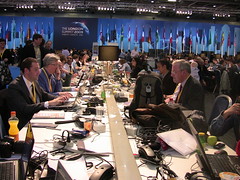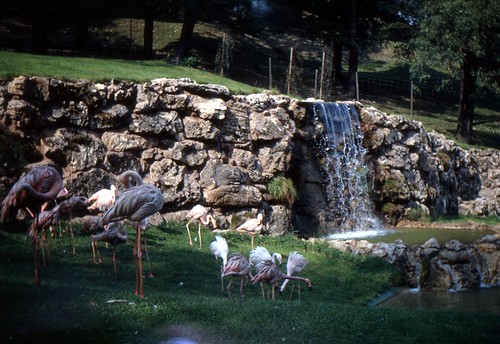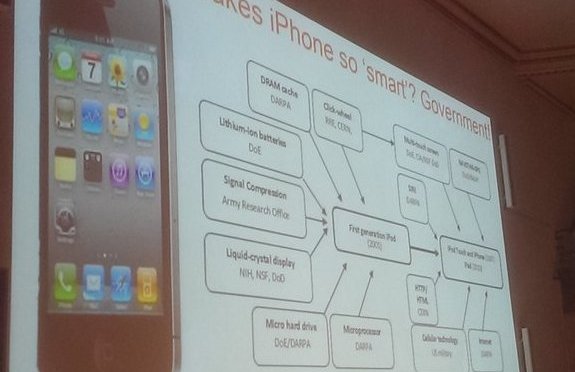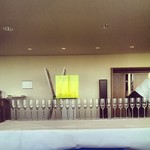 The G20 Voice team did a brilliant job. The first I heard about this gig was a phone call from Shane McCracken on the day I’d returned from SXSWi (ie when I’d just finished a 16-hour journey and was trying to stay awake to stave off jet-lag) and then two weeks later I was sitting in the Excel Centre a few yards from President Obama.
The G20 Voice team did a brilliant job. The first I heard about this gig was a phone call from Shane McCracken on the day I’d returned from SXSWi (ie when I’d just finished a 16-hour journey and was trying to stay awake to stave off jet-lag) and then two weeks later I was sitting in the Excel Centre a few yards from President Obama.
Not everything went perfectly, but the problems were not of the obvious kind that could have been predicted and mitigated against. They were mostly things none of us knew about how the day would run, what the content would be and how a group of 50 bloggers would react to being thrown together to report on something so huge. The main feedback I gave to G20Voice was that I was very impressed by their flexibility and willingness to learn with us over the course of the two days we were together.
So there’s a bunch of things I think I learned in the course of the two days we had together that I’d like to work out and share here.
The only events I’ve covered before have been traditional conferences or trade shows. There’s always *something* going on, whether it’s plenary sessions, product demos or just delegates hanging around chatting at lunchtime, and so it’s easy to blog without very much preparation or knowledge of the subject area. You can do the standard in through the ears, out through the fingers liveblogging or get out among the people with a camera, jump in and ask open questions, following up with intelligent probes.
The G20 summit was not like that.
The summit happens in private, away from any reporters at all. They talk all day, perhaps have a little argy-bargy, but then emerge with a summary of what they’ve agreed – the communique.
 I felt cut off. Cut off from the action and cut off from my online tribe because I was being boring – I had nothing of interest to say for most of the day, because nothing was really happening except the occasional entrance of a Minister or Celebrity Activist. I blogged during the day (and the day before) that I didn’t know what to do to be useful. I wanted to be like the other guys who seemed to know everything about everything and were, no doubt, writing Pullitzer Prize-worthy copy all day long. I kept thinking that I should be doing something else, but when I went and did something, I thought I should be back at the desk and online.
I felt cut off. Cut off from the action and cut off from my online tribe because I was being boring – I had nothing of interest to say for most of the day, because nothing was really happening except the occasional entrance of a Minister or Celebrity Activist. I blogged during the day (and the day before) that I didn’t know what to do to be useful. I wanted to be like the other guys who seemed to know everything about everything and were, no doubt, writing Pullitzer Prize-worthy copy all day long. I kept thinking that I should be doing something else, but when I went and did something, I thought I should be back at the desk and online.
But just because it’s a news event, doesn’t mean you only have the day to publish stuff in. I’m lucky, I don’t have any deadlines or a target for how much to write or create, except those that I make for myself. And I was forgetting that I do have an eye for interesting stuff and so the behind the scenes content that I’ve shared with you seemed like it was a cop out, too easy, just hanging around behind other people being photographed and filmed. It wasn’t until I got it all out and had a look at it that I realised where the story was and that I had stuff that was unique.
So Learning Point #1 Remember you are unique and have a unique perspective. Be yourself and trust that you will be enough.
 It helped me to have plenty of equipment so that i knew that when I did have something to report, I’d be ready. I had two laptops, one mainly for tracking stuff on twitter, flickr and the G20Voice site and the other for getting stuff done, writing, encoding video and uploading photos. I was lent an HG10 by Canon (thanks to Colin & Donna at 1000Heads) so I could shoot anything I wanted to. I was also lent an iPod touch and handsfree set (thanks to Best Before TV, especially Karen & Steve, whose touch it was!) so that I could record Audioboos – I like this a lot. I also had my flip camera in case I needed to just do something simple and quick, my N95 for backup photos, video and Qiks and my Edirol in case I wanted to do longer audio interviews.
It helped me to have plenty of equipment so that i knew that when I did have something to report, I’d be ready. I had two laptops, one mainly for tracking stuff on twitter, flickr and the G20Voice site and the other for getting stuff done, writing, encoding video and uploading photos. I was lent an HG10 by Canon (thanks to Colin & Donna at 1000Heads) so I could shoot anything I wanted to. I was also lent an iPod touch and handsfree set (thanks to Best Before TV, especially Karen & Steve, whose touch it was!) so that I could record Audioboos – I like this a lot. I also had my flip camera in case I needed to just do something simple and quick, my N95 for backup photos, video and Qiks and my Edirol in case I wanted to do longer audio interviews.
The thing I’d forgotten was that I’ve switched to Linux on my two laptops since I last had an HG10 and I could have done without all the faffing needed to start from scratch in order to transcode from AVCHD to MPEG. I’ve now found Handbrake which is actually very good indeed especially once you have time to play around with it.
Learning Point #2 Take more than you need and ask for what you want and need. Make sure you’ve got all your software up to date and test loan kit before you get there.
Yes, I felt cut off. But surely I was on a table full of bloggers, just like me? Well no, I was actually on a table full of specialist journalists (in some cases operating in a tiny niche) who choose to mainly communicate online. They were mostly lovely, but there wasn’t a great deal of playful collaboration. There were few other media hacker types of the sort that frequent the Tuttle Club.
I quickly tired of us being referred to as “The Bloggers”. I think if there’d been a media hacker table or just a few more of the folk I normally play with, we’d have come up with something more creative. It might have got us chucked out or severely reprimanded, but it would have been more fun.
Learning Point #3 is for the G20Voice team (or anyone else doing this sort of work) and comes in two parts: a) All that bloggers might have in common is that they have a blog. and b) Focus the Briefing Day on helping the bloggers get to know each other, trust each other and collaborate and interact online (there’s a whole nother post on this, I think)
 I was really pleased with the photos I took of the president at the podium. I know they’re all much the same and that people all around me were taking the same shot too, but I really like that I got them for my very own. I could not have done so if I’d done what I was told. Firstly, I went to the front of the queue when photographers were called. I took advantage of the fact that my pass said “Blogger” while others had, I imagine, “Journalist” or “Photographer”. I used the ambiguity to be a writer when it suited me and a photographer when that’s what I wanted to be. So I then just went up to the front of the hall with the other photographers. It was crowded and the press office guys were going back and forth trying to weed out people who weren’t official photographers. I felt a little inadequate with my little video camera, but I just stood my ground and avoided eye contact with them by looking at my viewfinder.
I was really pleased with the photos I took of the president at the podium. I know they’re all much the same and that people all around me were taking the same shot too, but I really like that I got them for my very own. I could not have done so if I’d done what I was told. Firstly, I went to the front of the queue when photographers were called. I took advantage of the fact that my pass said “Blogger” while others had, I imagine, “Journalist” or “Photographer”. I used the ambiguity to be a writer when it suited me and a photographer when that’s what I wanted to be. So I then just went up to the front of the hall with the other photographers. It was crowded and the press office guys were going back and forth trying to weed out people who weren’t official photographers. I felt a little inadequate with my little video camera, but I just stood my ground and avoided eye contact with them by looking at my viewfinder.
Learning Point #4 Be confident, use ambiguity to your advantage, go for what you want.
So by the Friday morning, I felt like I was just about ready to get started. I guess the overall point would be it’s OK to learn as you go, keep asking the question of how you can be useful and remember what you learn for next time.














